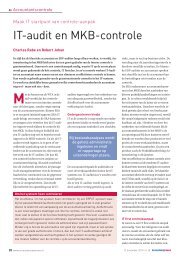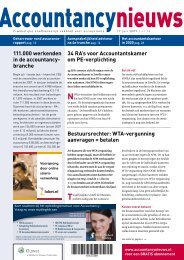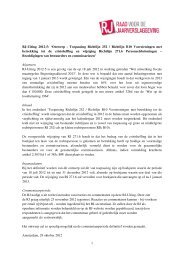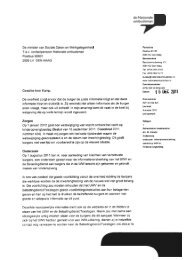Appetite for change - Accountancy Nieuws
Appetite for change - Accountancy Nieuws
Appetite for change - Accountancy Nieuws
Create successful ePaper yourself
Turn your PDF publications into a flip-book with our unique Google optimized e-Paper software.
Section 5What will new policies mean <strong>for</strong> business?The results of PricewaterhouseCoopers 2010 Global CEOSurvey suggest the <strong>change</strong>s are likely to be related to newproducts and services, reducing emissions and allocatingcapital. There is an increasing realisation among businessexecutives that climate <strong>change</strong> presents both risks andopportunities, but that it is fundamentally about <strong>change</strong> thatwill create demand <strong>for</strong> innovative products and services.The first to market with these innovations are likely to be at aclear advantage.Today’s heavily impacted industries consider new productsand services the second most likely outcome of climate<strong>change</strong> policies such as emissions trading schemes,carbon taxes, energy efficiency standards and reportingrequirements. Many heavily impacted sectors also expectcompliance with these policies to be costly. Energy CEOs,<strong>for</strong> example, <strong>for</strong>esee more cost and barriers to growth thanutilities CEOs.To prepare <strong>for</strong> these <strong>change</strong>s, 61 per cent of CEOs that hada climate <strong>change</strong> strategy last year maintained their climate<strong>change</strong> investments through the financial crisis. Seventeenper cent actually increased funding. New regulations,taxes and trading schemes are likely in the next few years.Businesses that are not already monitoring these policiesand planning <strong>for</strong> their likely consequences will not be able toadapt as quickly.Business executives revealed they were, in fact, counting onoutpacing their peers through environmental policies. Sixtyseven per cent of all the executives in this survey said theyexpect to create a competitive advantage (see fig. 1 on page9). For those already exceeding environmental requirements,the number increases to 74 per cent.Figure 30Potential impacts of climate-<strong>change</strong> initiativesGlobalEngineering& ConstructionConsumer GoodsEnergyIndustrialManufacturingRetail & DistributiveWholesaleUtilitiesTICEFinancial ServicesOur response to climate-<strong>change</strong> initiatives will provide a reputational advantage<strong>for</strong> my company among key stakeholders, including employees. Respondents whostated ‘agree’ or ‘strongly agree’. Base: Total (1198)GlobalEngineering& ConstructionConsumer GoodsEnergyIndustrialManufacturingRetail & DistributiveWholesaleUtilitiesTICEFinancial Services61%65%62%71%63%54%67%59%54%47%49%40%62%70%46%67%52%39%Climate <strong>change</strong> initiatives will lead to significant new product and service opportunities<strong>for</strong> my company. Respondents who stated ‘agree’ or ‘strongly agree’. Base: Total (1198)42 <strong>Appetite</strong> <strong>for</strong> <strong>change</strong>. PricewaterhouseCoopers.
















